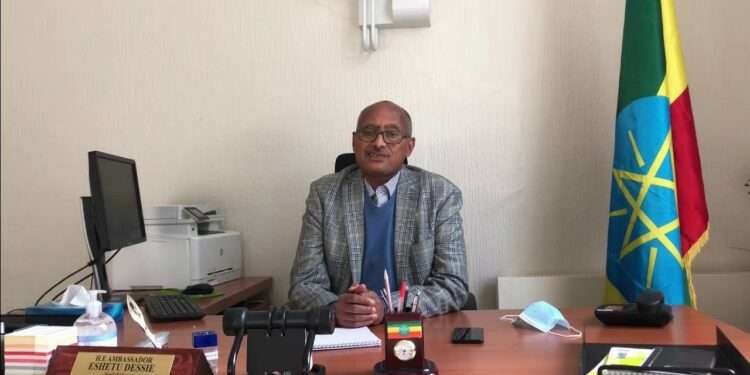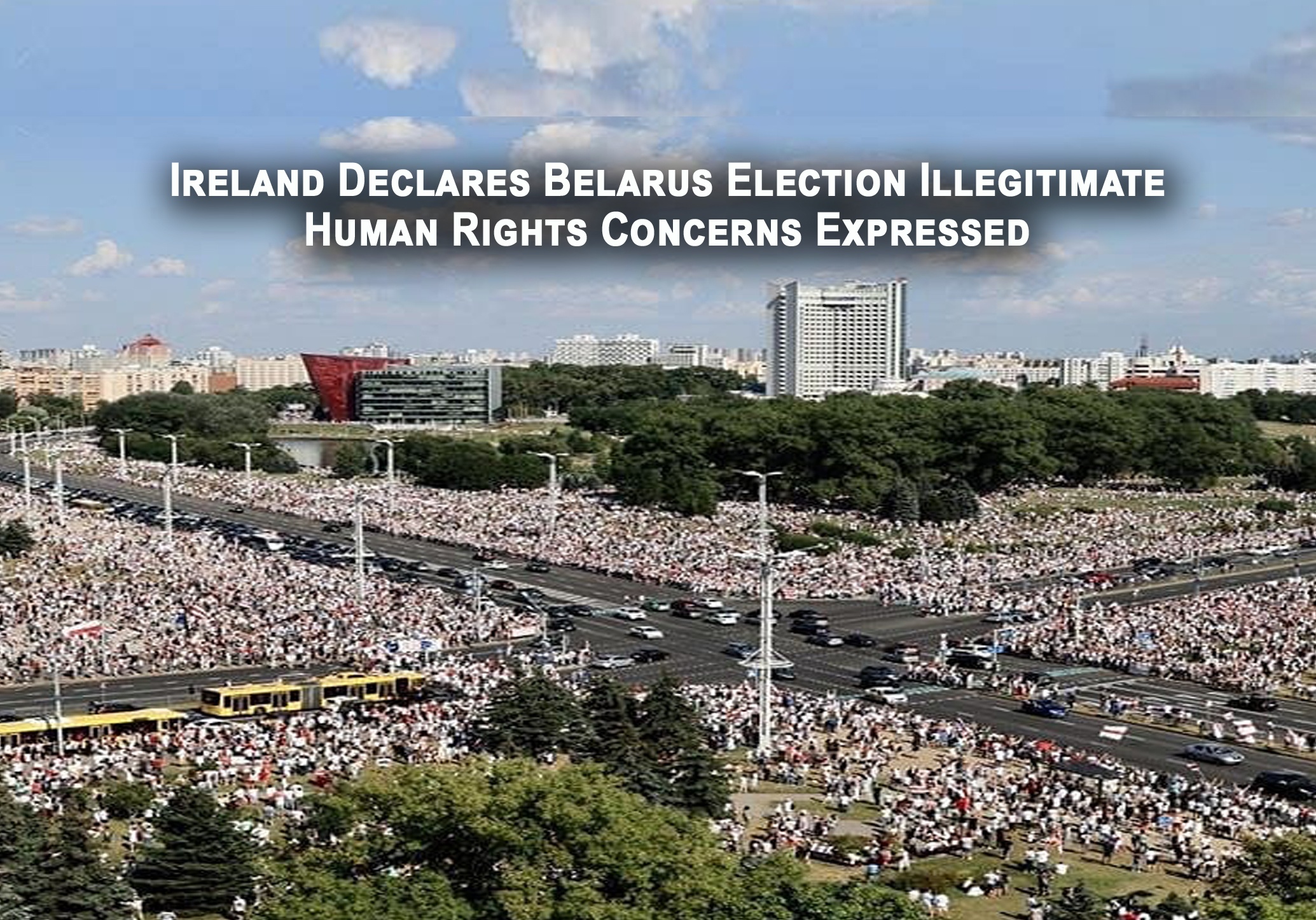by Miceál O’Hurley
DUBLIN – In December, 2019, almost 9 months ago, reports emerged of a novel strain of a coronavirus with an alarming infection rate. Moving beyond an epidemic, the virus, identified and named as Covid-19, spread worldwide. To date, some 778,082 people around the globe have been reported to have died because of the Covid-19 pandemic. The pandemic’s toll has been devastating, wrecking economies, stressing health care systems and causing countries worldwide to impose travel bans and restrictions to thwart the spread of the virus. As Ireland continues to lift many of the restrictions previously imposed to help contain the Covid-19 pandemic, even while delaying others, it gives us time to reflect upon the work of diplomacy in action and the critical role played by the Diplomatic Corps in continuing to serve people during the crisis.
In a continuing series of interviews, we are engaging with diplomatic missions in Ireland to provide an insight into how diplomacy has been conducted during these trying circumstances and provide some insight into the challenges that may lie ahead. In this interview, the Ethiopian Ambassador to Ireland, His Excellency Eshetu Dessie Hordofa, spoke with me about the pandemic and the conduct of diplomacy and consular services during this difficult period.

Ambassador Hordofa completed his Masters Degree in Organizational Leadership from AZUSA Pacific University, California (U.S.A.) having earned a Bachelor of Arts in Economics from Civil Service College (Civil Service University) as well as a Diploma in Mathematics from Kotobe Collage of Teacher Education. He holds a Certificate in Management from the Open University Business School as well. Ambassador Hordofa’s career in public service has been extensive. Amongst just some of his positions of public trust and responsibility prior to being elevated to the rank of Ambassador, His Excellency served as the Speaker of the Oromia Regional State Council (parliament) before becoming Vice President of Oromia Regional State. Ambassador Hordofa’s service also included duties as a Cabinet Minister of FDRE, giving service as Deputy Director of Ethiopian Revenue and Custom Authority, acting as Advisor of Oromia Regional State President at the rank of Vice President, serving as a Member of the Oromia Regional State Council and as a Member of House of Federation. On 28 February 2019, His Excellency Mr. Eshetu Dessie Hordofa presented his letters of credence extraordinary and plenipotentiary to President Michael D. Higgins as the Ambassador of the Federal Democratic Republic of Ethiopia to Ireland.
Mister Ambassador, I know how busy you have been so let me start by thanking you for taking time to speak with me about these trying current affairs. If you would, what did you find to be the greatest challenge that emerged for your Mission during the Covid-19 pandemic?
The main challenge that we faced during the pandemic was giving Consular services. The fact that Consular Staff were not considered to be among the essential works challenged our staff and clients which were in an immediate need of getting visas, and document authentication for people which had to meet timelines.
Services like renewal of passports and Yellow cards need approval from sectoral associations like the Immigration Agency and its mandatory to post documents for approvals which made communication difficult. In document authentication, which basically is assessing samples of signatures, its compulsory that we give and receive documents, which made the service provision risky for the officers as they had to make contacts with the clients. And, even though the Staff in the Embassy are extra careful and follow guidelines of social distancing, some clients seem to not obey the rules.
With a general prohibition on travel and restricted visits to Embassies, what are some of the ways the Ethiopian Mission adapted to meet the needs of people asking for services?
The staff has tried to adopt new ways of carrying out tasks during the pandemic. We have tried to approach the Diaspora through phone, email and Facebook. We are trying to make things electronic as possible.

Was your Mission involved in helping to facilitate the provision of Personal Protection Equipment (PPE) to Ireland or within the EU or for your country? If so, please explain.
During the lockdown, our Mission’s staff were engaged in Diaspora mobilisation in order to help finance the Ethiopian National Committee established to coordinate activities in the fight against the Pandemic. The work included mobilisation of the Diaspora to finance and to contribute in kind that is in aiding medical equipment.
What are some lessons learned during the Covid-19 pandemic that you think will have an impact on how diplomacy is conducted in the future?
The biggest lesson learnt is that changes in response to immediate crises can give birth to new norms. It’s a fact that international relations and diplomacy are greatly influenced by Protocol and Personal engagements. The new guidelines that we had to adopt have reduced the scope of personal interaction and are expected to have long lasting consequences. Diplomacy has transited to a new era that is virtual. We all have been blessed by the developed ZOOM application which has proven change of approaches might even be cost effective instead of travelling to take part in meetings. To give an example, Negotiations of the GERD (Grand Ethiopian Renaissance Dam) between Ethiopia, Sudan and Egypt have been carried out virtually which used to involve travelling between the countries in the past. It is a proof that it is possible to conduct a great deal of business virtually and an inspiration for other new and creative ways of conducting business.
Are there any changes in the way you will provide Consular services for the foreseeable future?
The visa applications will be online and services provided are to be made contactless as much as possible. Anyone who wishes to travel to Ethiopia can use this link https://www.ethiopiaevisa.com/ and apply first then collect from the embassy. Our staff is available for a chat on any questions clients have through our Facebook page: Embassy of Ethiopia – Dublin.
What are the plans for your country to move towards a ‘normalisation’ of travel and tourism?
As its known, in response to curb the impacts of the pandemic most countries including ours had been forced to implement national lockdowns and travel restrictions and shutdown of borders2 making tourism one of the hardest-hit sectors. For a country like Ethiopia in which tourism is a significant contributor to the national economy, the government had to adopt measures to mitigate the effects of COVID-19 in tourism and support recovery. Since Ethiopia registered its first case of coronavirus on March 13, 2020 and has since initiated a state of emergency to curb the spread of the disease. International travel in and out of the country is still possible, however, limited flights are being operated. All travellers to Ethiopia were required to enter a mandatory 14-day quarantine at specific hotels and facilities in the capital city. As of the end of June, the quarantine period has been reduced to seven days. The government has invested heavily in the redevelopment of several parks in Addis Ababa. The Unity Park, Entoto Park, Meskal Square and “Beautifying Sheger” projects will provide the city with a much needed facelift that could motivate residents to explore the capital city of Addis Ababa, in an attempt to help the domestic tourism to recover first as residents refrain from travelling abroad with the coronavirus pandemic affecting international travel at a national scale. Ethiopia’s diverse, yet untapped, tourist offerings in the north and south can be accessed through Ethiopian Airlines’ domestic network.
By far the most common measures adopted by countries are economy-wide stimulus packages targeting the most impacted sectors. Of these, undeniably tourism is one of the most directly affected. emergency economic funds and economic assistance, especially to SMEs and self-employed and investment programmes aiming at mitigating the immediate effects of the pandemic. Other tourism specific measures include credit guarantees for tourism businesses and programmes to support airlines.
Any pandemic is a tragedy. But even in such situations there are always stories that inspire. Would you care to share one?
The recovery from coronavirus of an Ethiopian man who is believed to be 114 years old was an incredible and inspiring story.
Ambassador Hordofa, I want to thank you for taking the time your busy schedule to share your thoughts and observations with me concerning the Covid-19 pandemic and diplomacy. On behalf of Diplomacy in Ireland – The European Diplomat, thanks for taking time out of your busy schedule. We wish your Excellency, your staff and the Ethiopian people good health, prosperity and happiness.
You are most welcome, Miceál.
















































